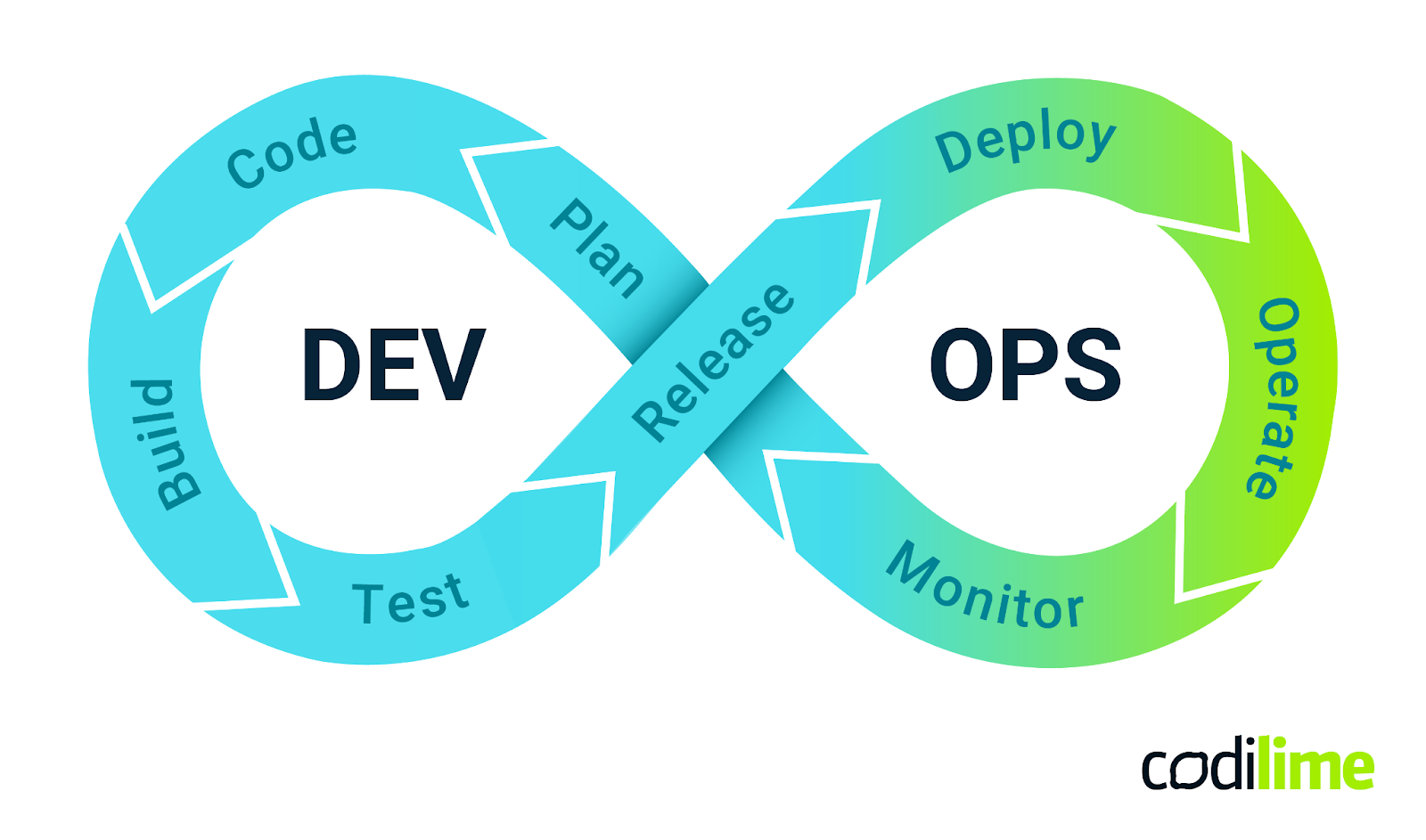The world of software development is constantly evolving, with new approaches and methodologies emerging to improve the efficiency and effectiveness of the development process. Two of the most popular methodologies are GitOps and DevOps. While they share some similarities, there are also some key differences between them.
DevOps – a short introduction
DevOps is a methodology that emphasizes collaboration and communication between development and operations teams. The goal is to streamline the development process, reduce time to market, and ensure high-quality software. DevOps is built on a set of principles, including continuous integration and delivery, infrastructure automation, and monitoring and logging.

Devops methodology assumes continuous development and releases of new functionalities. It requires good collaboration between development and operations teams. Even a minor lack of continuity can negatively impact the overall process and cause improper bug detection. You can find more about the DevOps lifecycle and its effective adaptation on our blog.
Moreover, as the DevOps operations continue to evolve, we can observe some DevOps trends that make this methodology crucial for productive digital transformation.
>>Learn about our approach to DevOps services.
GitOps overview
GitOps, on the other hand, is a methodology that leverages Git as a single source of truth for declarative infrastructure and application deployments. GitOps takes the principles of DevOps a step further by ensuring that all changes to the infrastructure and application code are made through Git pull requests. This ensures that all changes are tracked, audited, and reviewed, and that the entire process is automated.

DevOps and GitOps – the software development lifecycle (SDLC)
Software development lifecycles are the steps that create software applications and programs from the beginning. All include planning, design, coding and testing stages. Independent of whether it is a DevOps or GitOps approach, good software development lifecycle practices should be applied. With GitOps, where the code is potentially automatically deployed in the production environment, the testing phase should be well designed and automated.
We can also use different deployment approaches that support testing of the applications in production in a safe manner, like blue-green deployments, canary deployments, or A/B testing.
GitOps vs. DevOps – differences
One of the main differences between GitOps and DevOps is the focus of each methodology. DevOps is primarily focused on improving the collaboration between development and operations teams, whereas GitOps focuses on using Git as a single source of truth for infrastructure and application deployments.
What else separates GitOps from DevOps? The below points cover the main differences.
GitOps vs. DevOps – level of automation
Another difference between the two methodologies is the level of automation. While DevOps emphasizes automation, GitOps takes it to the next level by automating the entire deployment process through Git pull requests. This ensures that all changes are reviewed and approved before they are deployed, which helps to reduce the risk of errors and downtime.

GitOps vs. DevOps – control level
Finally, another key difference between GitOps and DevOps is the level of control that each provides. DevOps provides a high degree of control over the deployment process, allowing teams to make changes quickly and easily. GitOps, on the other hand, provides an even higher level of control over the entire process, including the infrastructure and application code, ensuring that all changes are tracked and audited.
Another widely-discussed concept is site reliability engineering (SRE) – both SRE and DevOps have grown in popularity in the IT world. To dive deeper into the topic, we highly recommend our previous article, where we discussed the differences between SRE and DevOps.
You can also check our other related articles:
And what DevOps and GitOps are not
DevOps or Gitops are not just a tool or technology. While DevOps involves the use of various tools and technologies, it is not defined or limited by them. Instead, DevOps is a holistic approach to software development and delivery that emphasizes collaboration, communication, and integration between development and operations teams.
On the other hand, GitOps is a set of principles and practices for managing software deployments and infrastructure using Git. However, GitOps is not limited to Git repositories. While Git is commonly used as the version control system in GitOps, it does not mean that other version control systems cannot be used. GitOps principles can be applied to other version control systems as well.
GitOps is also not a replacement for people. While GitOps promotes automation and declarative configuration, it does not eliminate the need for human intervention. Human decision-making and oversight are still essential in certain scenarios, such as resolving complex issues or making strategic deployment decisions.
DevOps is also not just about automation. Automation is an important aspect of DevOps but it is not the only focus. DevOps is about streamlining the entire software development and delivery process, which involves not just automation but also testing, deployment, monitoring, and feedback.
Finally, Devops is not the name of a job or position. Despite the fact, there are many “DevOps engineer” job offers, this is in fact just a simplification. We should understand “DevOps engineer” as somebody who is streamlining software development processes, introducing automation to operations, and following an agile methodology and approach in their day to day job.
Conclusion
In conclusion, while GitOps and DevOps share some similarities, there are also some key differences between them. GitOps takes the principles of DevOps a step further by leveraging Git as a single source of truth for deployed infrastructure. GitOps automates the entire deployment process through Git, ensuring a review process. DevOps puts more emphasis on collaboration between the development and operations teams.








